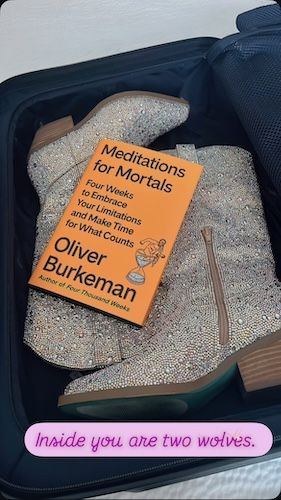“Are you living the life you chose? Are you living the life that chose you?”
It’s a warm autumn night in Nashville, and Jason Isbell is on stage at the legendary Ryman Auditorium asking some pretty big questions. I’m standing beside my dad, who gave me my love of music, and wearing rhinestone cowboy boots I bought on a Mary Oliver-inspired impulse: “If you suddenly and unexpectedly feel joy, don’t hesitate.” Dad and I are here because we love Isbell’s songbook and we’ve both wanted to see a show at the Ryman—the “mother church” of country music—for as long as I can remember. We’re here now in large part because of a book I read three years ago.
When Oliver Burkeman’s Four Thousand Weeks was released in August 2021, I was a few months into fully-vaccinated life and deep into the work of figuring out what I wanted post-covid existence to look like. Before the pandemic, I was busy to the point of being nearly burnt out. Work wasn’t the problem, and I think that made it harder. The commitments occupying my calendar and my headspace were all things that meant a lot to me—teaching yoga, helping lead a yoga teacher training, serving on the board of a local nonprofit, volunteering, traveling, spending time with my partner and friends—and I had chosen them all because they aligned with my values and interests. I should have been feeling engaged, fulfilled, and invigorated (or so I thought), but I was just. so. tired. And resentful? Yes. I resented all of the things I “had” to do, obligations I had willingly and even joyfully entered into.
By the time this realization hit, I was pretty far down the self-improvement road. I’d had the clarifying, perspective-shifting experience of navigating a loved one’s chronic and potentially fatal illness. I’d gone to a lot of therapy. I meditated. I journaled. I had found a gratitude practice that actually stuck. I’d read the self-help books and listened to the podcasts. I had, as the kids say, been doing the work. But I couldn’t quite see what to change or how to change it because, again, everything on my plate was something I wanted to have there. It all mattered.
Enter Oliver Burkeman:
The problem with trying to make time for everything that feels important—or just for enough of what feels important—is that you definitely never will. The reason isn’t that you haven’t yet discovered the right time management tricks or supplied sufficient effort, or that you need to start getting up earlier, or that you’re generally useless. It’s that the underlying assumption is unwarranted: there’s no reason to believe you’ll ever feel ‘on top of things,’ or make time for everything that matters, simply by getting more done.
You’re going to die someday, Burkeman tells us in the book whose title refers to the average human life span. If you can get your head around that and find a bone-deep acceptance of the reality that your time, energy, and resources are finite, you can figure out how to make the best of what you’ve got. And that, it turns out, involves a lot of saying no.
The core challenge of managing our limited time isn’t about how to get everything done—that’s never going to happen—but how to decide most wisely what not to do, and how to feel at peace about not doing it.
Burkeman is talking about opportunity cost. Every yes to one thing is a no to all the other things you could be doing with that same time and energy, so you better make your yeses count. To do this, you have to be willing to acknowledge that some things—some people, some relationships, some experiences, some opportunities—simply matter more to you than others, and you have to be willing to accept the consequences of that truth.
That was when the pieces fell into place for me. All of my yeses had been going to things I cared about, but I didn’t care about them equally. What’s more, some of the things I cared about less were taking up a disproportional amount of my time and energy. As the poet Nick Laird says, “Time is how you spend your love,” and I was not actually spending mine in a way that aligned with what I loved most.
 |
For me, Four Thousand Weeks was a case of the right book at the right time. Burkeman’s practicality and philosophy of radical acceptance gave me the permission I didn’t know I’d been waiting for to start taking things off my plate. And in the first year after reading it, I took almost everything off. The yoga studio I’d been teaching at closed, and I chose not to find another one. My term on the nonprofit board ended, and I chose not to renew. I turned down most invitations except from my very closest people. Where in the past, I would have said yes to something as long as my calendar was open, I started defaulting to the opposite. If something wasn’t a “hell yes,” it was a no.
Reader: most things are a no. This is just the reality of our finite lives. We will not get to do most of the things we want to do. Over time, Burkeman’s promise that this would become liberating proved itself to be true. As I got more and more comfortable saying no to almost everything, I had the time and capacity to say yes to more of the things that really count. For me, those things are time with family and close friends, travel, and experiences with art and nature. Today, I’m no less busy than I was before Oliver Burkeman barged into my life to remind me that it would end someday, but the busyness feels completely different because it is in service of my highest priorities.
I’m standing in the Ryman, where the seats are old church pews and the atmosphere feels sacred, because my time wasn’t already committed to something else. I’m here because it’s important and because nothing less important was clogging up my calendar. Gone are the days of, “I hope I get to do that someday when I’m done with all of these other things.” Someday is now. So when Jason Isbell asks, “Are you living the life you chose?” I stomp my rhinestone boots in an enthusiastic yes. And when he considers in a later song that, “Maybe time running out is a gift,” I look at my dad, and we both have tears in our eyes, and I know this is time—and love—well spent.
Source : The Book That Helped Me Beat Burnout
















Read anything that’s changed your life lately? Let’s chat in the comments!
The comments section is moderated according to our community guidelines. Please check them out so we can maintain a safe and supportive community of readers!